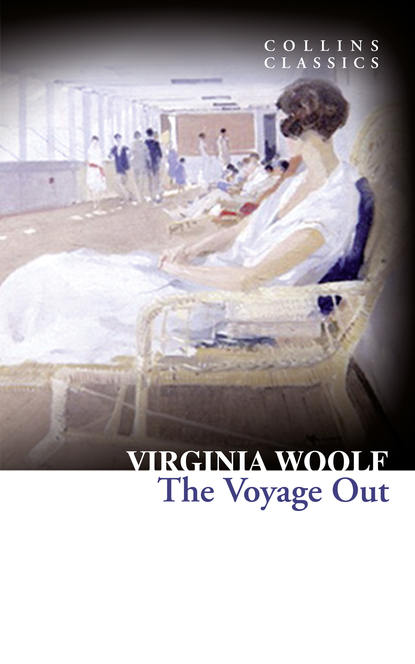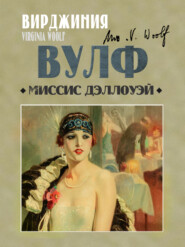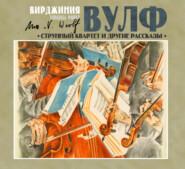По всем вопросам обращайтесь на: info@litportal.ru
(©) 2003-2025.
✖
The Voyage Out
Автор
Год написания книги
2019
Настройки чтения
Размер шрифта
Высота строк
Поля
“I can’t say I’ve ever thought ‘how,’” said Miss Vinrace. “If one cares one doesn’t think ‘how,’ Rachel,” which was aimed at the niece who had never yet “come” to her aunts as cordially as they wished.
“But you know I care for you, don’t you, dear, because you’re your mother’s daughter, if for no other reason, and there are plenty of other reasons”—and she leant over and kissed her with some emotion, and the argument was spilt irretrievably about the place like a bucket of milk.
By these means Rachel reached that stage in thinking, if thinking it can be called, when the eyes are intent upon a ball or a knob and the lips cease to move. Her efforts to come to an understanding had only hurt her aunt’s feelings, and the conclusion must be that it is better not to try. To feel anything strongly was to create an abyss between oneself and others who feel strongly perhaps but differently. It was far better to play the piano and forget all the rest. The conclusion was very welcome. Let these odd men and women—her aunts, the Hunts, Ridley, Helen, Mr. Pepper, and the rest—be symbols,—featureless but dignified, symbols of age, of youth, of motherhood, of learning, and beautiful often as people upon the stage are beautiful. It appeared that nobody ever said a thing they meant, or ever talked of a feeling they felt, but that was what music was for. Reality dwelling in what one saw and felt, but did not talk about, one could accept a system in which things went round and round quite satisfactorily to other people, without often troubling to think about it, except as something superficially strange. Absorbed by her music she accepted her lot very complacently, blazing into indignation perhaps once a fortnight, and subsiding as she subsided now. Inextricably mixed in dreamy confusion, her mind seemed to enter into communion, to be delightfully expanded and combined with the spirit of the whitish boards on deck, with the spirit of the sea, with the spirit of Beethoven Op. 112, even with the spirit of poor William Cowper there at Olney. Like a ball of thistledown it kissed the sea, rose, kissed it again, and thus rising and kissing passed finally out of sight. The rising and falling of the ball of thistledown was represented by the sudden droop forward of her own head, and when it passed out of sight she was asleep.
Ten minutes later Mrs. Ambrose opened the door and looked at her. It did not surprise her to find that this was the way in which Rachel passed her mornings. She glanced round the room at the piano, at the books, at the general mess. In the first place she considered Rachel aesthetically; lying unprotected she looked somehow like a victim dropped from the claws of a bird of prey, but considered as a woman, a young woman of twenty-four, the sight gave rise to reflections. Mrs. Ambrose stood thinking for at least two minutes. She then smiled, turned noiselessly away and went, lest the sleeper should waken, and there should be the awkwardness of speech between them.
CHAPTER 3 (#ulink_4a03451e-b5b1-5f97-9556-f2446c2679e2)
Early next morning there was a sound as of chains being drawn roughly overhead; the steady heart of the Euphrosyne slowly ceased to beat; and Helen, poking her nose above deck, saw a stationary castle upon a stationary hill. They had dropped anchor in the mouth of the Tagus, and instead of cleaving new waves perpetually, the same waves kept returning and washing against the sides of the ship.
As soon as breakfast was done, Willoughby disappeared over the vessel’s side, carrying a brown leather case, shouting over his shoulder that every one was to mind and behave themselves, for he would be kept in Lisbon doing business until five o’clock that afternoon.
At about that hour he reappeared, carrying his case, professing himself tired, bothered, hungry, thirsty, cold, and in immediate need of his tea. Rubbing his hands, he told them the adventures of the day: how he had come upon poor old Jackson combing his moustache before the glass in the office, little expecting his descent, had put him through such a morning’s work as seldom came his way; then treated him to a lunch of champagne and ortolans; paid a call upon Mrs. Jackson, who was fatter than ever, poor woman, but asked kindly after Rachel—and O Lord, little Jackson had confessed to a confounded piece of weakness—well, well, no harm was done, he supposed, but what was the use of his giving orders if they were promptly disobeyed? He had said distinctly that he would take no passengers on this trip. Here he began searching in his pockets and eventually discovered a card, which he planked down on the table before Rachel. On it she read, “Mr. and Mrs. Richard Dalloway, 23 Browne Street, Mayfair.”
“Mr. Richard Dalloway,” continued Vinrace, “seems to be a gentleman who thinks that because he was once a member of Parliament, and his wife’s the daughter of a peer, they can have what they like for the asking. They got round poor little Jackson anyhow. Said they must have passages—produced a letter from Lord Glenaway, asking me as a personal favour—overruled any objections Jackson made (I don’t believe they came to much), and so there’s nothing for it but to submit, I suppose.”
But it was evident that for some reason or other Willoughby was quite pleased to submit, although he made a show of growling.
The truth was that Mr. and Mrs. Dalloway had found themselves stranded in Lisbon. They had been travelling on the Continent for some weeks, chiefly with a view to broadening Mr. Dalloway’s mind. Unable for a season, by one of the accidents of political life, to serve his country in Parliament, Mr. Dalloway was doing the best he could to serve it out of Parliament. For that purpose the Latin countries did very well, although the East, of course, would have done better.
“Expect to hear of me next in Petersburg or Teheran,” he had said, turning to wave farewell from the steps of the Travellers’. But a disease had broken out in the East, there was cholera in Russia, and he was heard of, not so romantically, in Lisbon. They had been through France; he had stopped at manufacturing centres where, producing letters of introduction, he had been shown over works, and noted facts in a pocket-book. In Spain he and Mrs. Dalloway had mounted mules, for they wished to understand how the peasants live. Are they ripe for rebellion, for example? Mrs. Dalloway had then insisted upon a day or two at Madrid with the pictures. Finally they arrived in Lisbon and spent six days which, in a journal privately issued afterwards, they described as of “unique interest.” Richard had audiences with ministers, and foretold a crisis at no distant date, “the foundations of government being incurably corrupt. Yet how blame, etc.”; while Clarissa inspected the royal stables, and took several snapshots showing men now exiled and windows now broken. Among other things she photographed Fielding’s grave, and let loose a small bird which some ruffian had trapped, “because one hates to think of anything in a cage where English people lie buried,” the diary stated. Their tour was thoroughly unconventional, and followed no meditated plan. The foreign correspondents of the Times decided their route as much as anything else. Mr. Dalloway wished to look at certain guns, and was of opinion that the African coast is far more unsettled than people at home were inclined to believe. For these reasons they wanted a slow inquisitive kind of ship, comfortable, for they were bad sailors, but not extravagant, which would stop for a day or two at this port and at that, taking in coal while the Dalloways saw things for themselves. Meanwhile they found themselves stranded in Lisbon, unable for the moment to lay hands upon the precise vessel they wanted. They heard of the Euphrosyne, but heard also that she was primarily a cargo boat, and only took passengers by special arrangement, her business being to carry dry goods to the Amazons, and rubber home again. “By special arrangement,” however, were words of high encouragement to them, for they came of a class where almost everything was specially arranged, or could be if necessary. On this occasion all that Richard did was to write a note to Lord Glenaway, the head of the line which bears his title; to call on poor old Jackson; to represent to him how Mrs. Dalloway was so-and-so, and he had been something or other else, and what they wanted was such and such a thing. It was done. They parted with compliments and pleasure on both sides, and here, a week later, came the boat rowing up to the ship in the dusk with the Dalloways on board of it; in three minutes they were standing together on the deck of the Euphrosyne. Their arrival, of course, created some stir, and it was seen by several pairs of eyes that Mrs. Dalloway was a tall slight woman, her body wrapped in furs, her head in veils, while Mr. Dalloway appeared to be a middle-sized man of sturdy build, dressed like a sportsman on an autumnal moor. Many solid leather bags of a rich brown hue soon surrounded them, in addition to which Mr. Dalloway carried a despatch box, and his wife a dressing-case suggestive of a diamond necklace and bottles with silver tops.
“It’s so like Whistler!” she exclaimed, with a wave towards the shore, as she shook Rachel by the hand, and Rachel had only time to look at the grey hills on one side of her before Willoughby introduced Mrs. Chailey, who took the lady to her cabin.
Momentary though it seemed, nevertheless the interruption was upsetting; every one was more or less put out by it, from Mr. Grice, the steward, to Ridley himself. A few minutes later Rachel passed the smoking-room, and found Helen moving arm-chairs. She was absorbed in her arrangements, and on seeing Rachel remarked confidentially:
“If one can give men a room to themselves where they will sit, it’s all to the good. Arm-chairs are the important things—” She began wheeling them about. “Now, does it still look like a bar at a railway station?”
She whipped a plush cover off a table. The appearance of the place was marvellously improved.
Again, the arrival of the strangers made it obvious to Rachel, as the hour of dinner approached, that she must change her dress; and the ringing of the great bell found her sitting on the edge of her berth in such a position that the little glass above the washstand reflected her head and shoulders. In the glass she wore an expression of tense melancholy, for she had come to the depressing conclusion, since the arrival of the Dalloways, that her face was not the face she wanted, and in all probability never would be.
However, punctuality had been impressed on her, and whatever face she had, she must go in to dinner.
These few minutes had been used by Willoughby in sketching to the Dalloways the people they were to meet, and checking them upon his fingers.
“There’s my brother-in-law, Ambrose, the scholar (I daresay you’ve heard his name), his wife, my old friend Pepper, a very quiet fellow, but knows everything, I’m told. And that’s all. We’re a very small party. I’m dropping them on the coast.”
Mrs. Dalloway, with her head a little on one side, did her best to recollect Ambrose—was it a surname?—but failed. She was made slightly uneasy by what she had heard. She knew that scholars married any one—girls they met in farms on reading parties; or little suburban women who said disagreeably, “Of course I know it’s my husband you want; not me.”
But Helen came in at that point, and Mrs. Dalloway saw with relief that though slightly eccentric in appearance, she was not untidy, held herself well, and her voice had restraint in it, which she held to be the sign of a lady. Mr. Pepper had not troubled to change his neat ugly suit.
“But after all,” Clarissa thought to herself as she followed Vinrace in to dinner, “everyone’s interesting really.”
When seated at the table she had some need of that assurance, chiefly because of Ridley, who came in late, looked decidedly unkempt, and took to his soup in profound gloom.
An imperceptible signal passed between husband and wife, meaning that they grasped the situation and would stand by each other loyally. With scarcely a pause Mrs. Dalloway turned to Willoughby and began:
“What I find so tiresome about the sea is that there are no flowers in it. Imagine fields of hollyhocks and violets in mid-ocean! How divine!”
“But somewhat dangerous to navigation,” boomed Richard, in the bass, like the bassoon to the flourish of his wife’s violin. “Why, weeds can be bad enough, can’t they, Vinrace? I remember crossing in the Mauretania once, and saying to the Captain—Richards—did you know him?—‘Now tell me what perils you really dread most for your ship, Captain Richards?’ expecting him to say icebergs, or derelicts, or fog, or something of that sort. Not a bit of it. I’ve always remembered his answer. ‘Sedgiusaquatici,’ he said, which I take to be a kind of duck-weed.”
Mr. Pepper looked up sharply, and was about to put a question when Willoughby continued:
“They’ve an awful time of it—those captains! Three thousand souls on board!”
“Yes, indeed,” said Clarissa. She turned to Helen with an air of profundity. “I’m convinced people are wrong when they say it’s work that wears one; it’s responsibility. That’s why one pays one’s cook more than one’s housemaid, I suppose.”
“According to that, one ought to pay one’s nurse double; but one doesn’t,” said Helen.
“No; but think what a joy to have to do with babies, instead of saucepans!” said Mrs. Dalloway, looking with more interest at Helen, a probable mother.
“I’d much rather be a cook than a nurse,” said Helen. “Nothing would induce me to take charge of children.”
“Mothers always exaggerate,” said Ridley. “A well-bred child is no responsibility. I’ve travelled all over Europe with mine. You just wrap ’em up warm and put ’em in the rack.”
Helen laughed at that. Mrs. Dalloway exclaimed, looking at Ridley:
“How like a father! My husband’s just the same. And then one talks of the equality of the sexes!”
“Does one?” said Mr. Pepper.
“Oh, some do!” cried Clarissa. “My husband had to pass an irate lady every afternoon last session who said nothing else, I imagine.”
“She sat outside the house; it was very awkward,” said Dalloway. “At last I plucked up courage and said to her, ‘My good creature, you’re only in the way where you are. You’re hindering me, and you’re doing no good to yourself.’”
“And then she caught him by the coat, and would have scratched his eyes out—” Mrs. Dalloway put in.
“Pooh—that’s been exaggerated,” said Richard. “No, I pity them, I confess. The discomfort of sitting on those steps must be awful.”
“Serve them right,” said Willoughby curtly.
“Oh, I’m entirely with you there,” said Dalloway. “Nobody can condemn the utter folly and futility of such behaviour more than I do; and as for the whole agitation, well! may I be in my grave before a woman has the right to vote in England! That’s all I say.”
The solemnity of her husband’s assertion made Clarissa grave.
“It’s unthinkable,” she said. “Don’t tell me you’re a suffragist?” she turned to Ridley.
“I don’t care a fig one way or t’other,” said Ambrose. “If any creature is so deluded as to think that a vote does him or her any good, let him have it. He’ll soon learn better.”
“You’re not a politician, I see,” she smiled.
“Goodness, no,” said Ridley.
“I’m afraid your husband won’t approve of me,” said Dalloway aside, to Mrs. Ambrose. She suddenly recollected that he had been in Parliament.
“Don’t you ever find it rather dull?” she asked, not knowing exactly what to say.

















